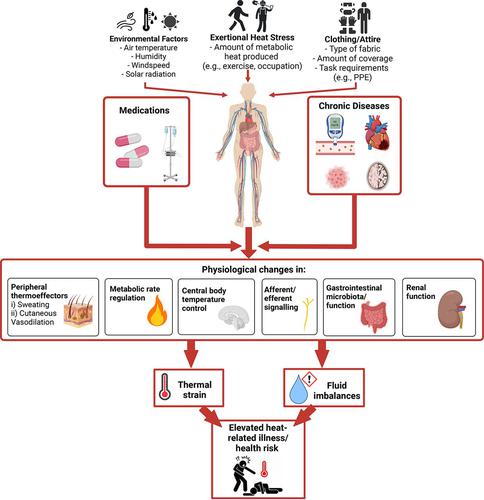当前位置:
X-MOL 学术
›
Pharmacol. Rev.
›
论文详情
Our official English website, www.x-mol.net, welcomes your feedback! (Note: you will need to create a separate account there.)
Effects of Medications on Heat Loss Capacity in Chronic Disease Patients: Health Implications Amidst Global Warming
Pharmacological Reviews ( IF 21.1 ) Pub Date : 2023-11-01 , DOI: 10.1124/pharmrev.122.000782 Jericho Wee 1 , Xiang Ren Tan 1 , Samuel H Gunther 1 , Mohammed Ihsan 1 , Melvin Khee Shing Leow 1 , Doreen Su-Yin Tan 1 , Johan G Eriksson 1 , Jason Kai Wei Lee 2
Pharmacological Reviews ( IF 21.1 ) Pub Date : 2023-11-01 , DOI: 10.1124/pharmrev.122.000782 Jericho Wee 1 , Xiang Ren Tan 1 , Samuel H Gunther 1 , Mohammed Ihsan 1 , Melvin Khee Shing Leow 1 , Doreen Su-Yin Tan 1 , Johan G Eriksson 1 , Jason Kai Wei Lee 2
Affiliation

|
Pharmacological agents used to treat or manage diseases can modify the level of heat strain experienced by chronically ill and elderly patients via different mechanistic pathways. Human thermoregulation is a crucial homeostatic process that maintains body temperature within a narrow range during heat stress through dry (i.e., increasing skin blood flow) and evaporative (i.e., sweating) heat loss, as well as active inhibition of thermogenesis, which is crucial to avoid overheating. Medications can independently and synergistically interact with aging and chronic disease to alter homeostatic responses to rising body temperature during heat stress. This review focuses on the physiologic changes, with specific emphasis on thermolytic processes, associated with medication use during heat stress. The review begins by providing readers with a background of the global chronic disease burden. Human thermoregulation and aging effects are then summarized to give an understanding of the unique physiologic changes faced by older adults. The effects of common chronic diseases on temperature regulation are outlined in the main sections. Physiologic impacts of common medications used to treat these diseases are reviewed in detail, with emphasis on the mechanisms by which these medications alter thermolysis during heat stress. The review concludes by providing perspectives on the need to understand the effects of medication use in hot environments, as well as a summary table of all clinical considerations and research needs of the medications included in this review.
中文翻译:

药物对慢性病患者散热能力的影响:全球变暖对健康的影响
用于治疗或控制疾病的药物可以通过不同的机制途径改变慢性病患者和老年患者所经历的热应激水平。人体体温调节是一个重要的稳态过程,在热应激期间通过干燥(即增加皮肤血流量)和蒸发(即出汗)热量损失以及主动抑制生热作用将体温维持在狭窄的范围内,这对于生热至关重要。避免过热。药物可以独立地和协同地与衰老和慢性疾病相互作用,以改变热应激期间对体温升高的稳态反应。本综述重点关注与热应激期间药物使用相关的生理变化,特别强调热分解过程。该评论首先向读者提供全球慢性病负担的背景。然后总结人体体温调节和衰老效应,以了解老年人面临的独特生理变化。主要章节概述了常见慢性疾病对体温调节的影响。详细回顾了用于治疗这些疾病的常用药物的生理影响,重点是这些药物在热应激期间改变热分解的机制。该综述最后提供了了解热环境中药物使用影响的必要性的观点,以及本综述中所含药物的所有临床考虑因素和研究需求的汇总表。
更新日期:2023-10-18
中文翻译:

药物对慢性病患者散热能力的影响:全球变暖对健康的影响
用于治疗或控制疾病的药物可以通过不同的机制途径改变慢性病患者和老年患者所经历的热应激水平。人体体温调节是一个重要的稳态过程,在热应激期间通过干燥(即增加皮肤血流量)和蒸发(即出汗)热量损失以及主动抑制生热作用将体温维持在狭窄的范围内,这对于生热至关重要。避免过热。药物可以独立地和协同地与衰老和慢性疾病相互作用,以改变热应激期间对体温升高的稳态反应。本综述重点关注与热应激期间药物使用相关的生理变化,特别强调热分解过程。该评论首先向读者提供全球慢性病负担的背景。然后总结人体体温调节和衰老效应,以了解老年人面临的独特生理变化。主要章节概述了常见慢性疾病对体温调节的影响。详细回顾了用于治疗这些疾病的常用药物的生理影响,重点是这些药物在热应激期间改变热分解的机制。该综述最后提供了了解热环境中药物使用影响的必要性的观点,以及本综述中所含药物的所有临床考虑因素和研究需求的汇总表。































 京公网安备 11010802027423号
京公网安备 11010802027423号